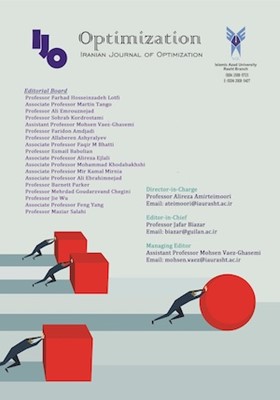Organizational Sustainable Competitive Advantage using ORESTE, TRIZ, SWOT Approaches in Gray Conditions
الموضوعات :Dorna Teimoory 1 , Alireza Alinezhad 2
1 - Msc. Student, Department of Industrial Engineering, Faculty of Industrial and Mechanical Engineering, Qazvin branch, Islamic Azad University, Qazvin, Iran.
2 - Associate Professor, Department of Industrial Engineering, Faculty of Industrial and Mechanical Engineering, Qazvin branch, Islamic Azad University, Qazvin, Iran.
الکلمات المفتاحية: SWOT analysis, strategic management, gray theory, sustainable competitive strength, TRIZ technique, ORESTE technique,
ملخص المقالة :
In today world, organizations’ performance and making the sustainable competitive strength have become incrementally important for them according to the quick global evolutions. The dairy industry is one of the most important industries which has made very competitive environment. The case study of this research is Kaleh Dairy Company as one of the active companies in dairy industries. One of the most important strategic management tool called SWOT analysis was used in this research to determine the position of Kaleh Company. IE, IFE, and EFE matrices have been used to determine the proper strategies and competitive position of the company. SWOT technique was mixed with TRIZ to remove defects and improve SWOT technique and also formulate strategies. Then, the formulated strategies were prioritized by gray ORESTE to rank strategies for lack of information and non-precision data which was resulted by experts using verbal variables.
Alinezhad, A., & Amini, A. (2011). Sensitivity analysis of TOPSIS technique: the results of change in the weight of one attribute on the final ranking of alternatives. Journal of Optimization in Industrial Engineering, (7), 23-28.
Alinezhad, A., & Esfandiari, N. (2012). Sensitivity Analysis in the QUALIFLEX and VIKOR Methods. Journal of Optimization in Industrial Engineering, 5(10), 29-34.
Alinezhad, A., Zohrehbandian, M., Kian, M., Ekhtiari, M., & Esfandiari, N. (2011). Extension of portfolio selection problem with fuzzy goal programming: A fuzzy allocated portfolio approach. Journal of optimization in industrial engineering, (9), 69-76.
Altshuller, G., & Shoulyak, L. (2006). 40 Principles: TRIZ Keys to Technical Innovation Karimi, M. &Mirkhani, N. Trans, Tehran: Resa publication, (8)160.
Brad, S., & Brad, E. (2015). Enhancing SWOT analysis with TRIZ-based tools to integrate systematic innovation in early task design. Procedia engineering, 131, 616-625.
David, F. (2015). Strategic Management, Parsiyan, A. &Arabi, S. Trans, Tehran: Cultural Research Bureau, (32)687.
Gao, C. Y., & Peng, D. H. (2011). Consolidating SWOT analysis with nonhomogeneous uncertain preference information. Knowledge-Based Systems, 24(6), 796-808.
Helms, M. M., & Nixon, J. (2010). Exploring SWOT analysis–where are we now? A review of academic research from the last decade. Journal of strategy and management, 3(3), 215-251.
Kamaeizadeh, Y., & Rezaei, M.R. (2015). determination of the optimum strategy to develop sea tourism using the combined SWOT-ANP approach (case study: Kish Island). The scientific and research Journal of Space-geography (51) 19-43.
Keller, S., & Price, C. (2014). Beyond Performance: How Great Organizations Build Ultimate Competitive Advantage?,Sadegh, R. Trans, Tehran: Ariyana Film Publication, (1) 400.
King, R. K. (2004). Enhancing SWOT analysis using triz and the bipolar conflict graph: a case study on the Microsoft Corporation. Proceedings of TRIZCON2004, 6th Annual Altshuller Institute.
Lee, T. R., Hsieh, Y. W., Dadura, A. M., & Wu, J. W. (2011). Applying TRIZ theory for industry development strategies under dynamic environment–the case of Taiwanese Jing-Ming Commercial District A. International Journal of Value Chain Management, 5(1), 25-51.
Malek, A., Dabaghi, A., & Aryanezhad, M. (2011). theoretical bases of gray systems by reviewing uncertainty methods, Tehran: Termeh express, (1) 82p.
Mehamedpour, M., & Asgharizadeh, A. (2008). ranking the faculties of a research center by ORESTE. management research, 1, 217-233.
Shahabi, R., Basiri, M., Kahag, M., Zonouzi, S. (2014). An ANP-SWOT approach for interdependency analysis and prioritizing the IRAN’S STEEL SCRAP industry strategies. Resources Policy, (42)18-26.
Wang, X. P., Zhang, J., & Yang, T. (2014). Hybrid SWOT approach for strategic planning and formulation in China Worldwide Express Mail Service. Journal of applied research and technology, 12(2), 230-238.


